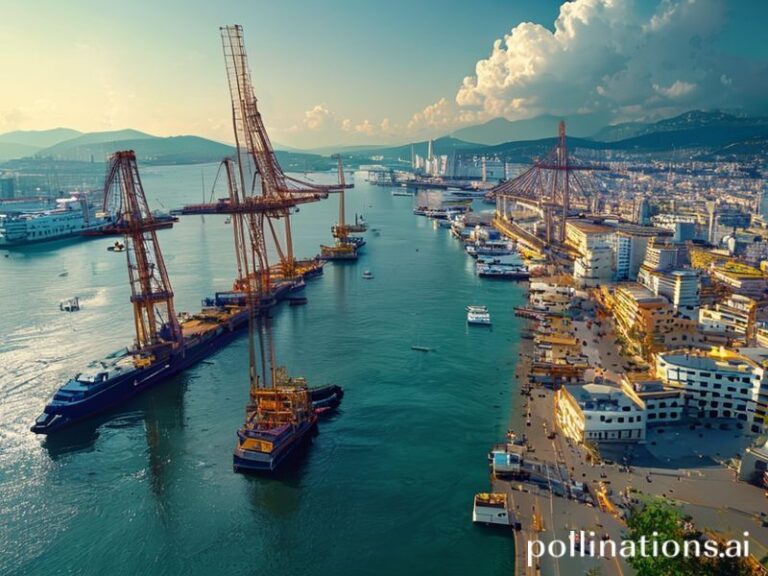Lithuania: How a Baltic Hedgehog Learned to Boss Around Elephants
Lithuania: The Baltic Hedgehog No One Expected to Have Spines
VILNIUS—Somewhere between the amber stalls of the capital and the NATO listening posts that now dot its forests like paranoid mushrooms, the Republic of Lithuania has stopped being a footnote and started behaving like a geopolitical hedgehog—small, prickly, and surprisingly willing to roll into the path of passing tanks. The world, comfortably distracted by larger, louder crises, has begun to notice that the hedgehog has friends in high places and a grudge older than most nation-states.
Let’s set the scene. Lithuania is roughly the size of West Virginia, except West Virginia never had to worry about the Russian enclave of Kaliningrad sliding tactical nukes into its backyard barbecue. Since regaining independence in 1990—an event marked by a human chain so long it could have doubled as the world’s most melancholic conga line—Lithuania has perfected the art of screaming politely in Brussels until someone pays attention. The strategy works. The country now hosts a rotating brigade of German troops, a fact that would have made 1941 spit out its coffee. History, it turns out, has a wicked sense of timing.
Globally, Lithuania’s newfound assertiveness is less about territorial bravado and more about offering a masterclass in how small states can hijack the agenda of lumbering alliances. When Vilnius decided to let Taiwan open a “Taiwanese Representative Office” instead of the usual cowardly “Taipei” fig leaf, Beijing responded with the diplomatic equivalent of a toddler hurling toys—trade sanctions, snarls, and a stern lecture about One China. The EU, suddenly reminded that it has a spine somewhere in the attic, filed a WTO case and discovered, to its mild horror, that it was defending… Lithuania. The lesson for other minnows in the international pond: pick a fight with the whale’s accountant; the whale might just back you up for the optics.
Meanwhile, Lithuania’s digital sector has become the world’s most improbable unicorn stable. Revolut, Vinted, and a constellation of blockchain startups have turned the country into the fintech equivalent of that quiet kid who suddenly shows up to prom in a Lamborghini. The tax code is friendly, the broadband is faster than most marriages, and the workforce speaks English with a fluency that shames native Londoners. Silicon Valley investors, bored of paying $4,000 for a San Francisco broom closet, now fly in to marvel at Vilnius office rents and the national willingness to pretend crypto isn’t a speculative fever dream. The broader implication: if you’re a small country with decent Wi-Fi and a masochistic work ethic, you too can rent-seek your way into the global elite.
Energy is the next act in this absurdist play. Lithuania recently finished a liquified-natural-gas terminal named “Independence”—because nothing says freedom like a floating freezer full of Qatari methane. The terminal allows the Baltic states to flip Russia the bird while still keeping the lights on, a gesture that would feel more heroic if Europe weren’t simultaneously begging Moscow for extra molecules every time the wind drops. Still, the symbolism is delicious: a nation that once queued for Soviet toilet paper now exports surplus electricity to Sweden, a country whose greatest historical contribution to Lithuania was the 17th-century occupation of half its coastline. Karma, like LNG, comes in liquid form.
All of this plays out under the weary gaze of a population that has learned to treat optimism as a controlled substance. Lithuanians joke that their national sport is “surviving history,” a pastime that requires equal doses of dark humor and caffeine. They have museums dedicated to occupations, deportations, and partisan bunkers, yet the gift shop sells ironic T-shirts proclaiming “Nobody Expects the Lithuanian Inquisition.” The message to the wider world is clear: we’ve seen worse, and we’re not impressed by your quarterly earnings call.
Conclusion: In an era when superpowers stumble over their own red lines and multilateralism resembles a badly rehearsed kindergarten play, Lithuania offers a sardonic reminder that agency isn’t proportional to GDP. Whether it’s facing down China, unplugging from Russian grids, or minting digital millionaires in a city that still smells of woodsmoke and wet cobblestones, the country behaves as if history owes it a favor—and intends to collect with interest. The rest of us, nursing our own crises of confidence, can only watch and wonder when the hedgehog will teach the elephant to dance.







